What the Bank of England rate cut means for your mortgage

UK housing crisis Soaring rent and mortgage |
GBNEWS
Sam Fox, co-founder of the UK Mortgage Centre, explains how the Bank of England’s recent rate cut could affect your mortgage
Don't Miss
Most Read
Latest
It’s been a week since the Bank of England announced its much-anticipated interest rate cut, and the phone hasn’t stopped ringing from clients with questions about what it means for them.
Many homeowners are understandably eager to understand how this will affect their mortgage repayments, particularly when deciding between a two-year or five-year fixed deal. Others are wondering if it’s worth fixing for longer than five years, given the recent base rate reduction.
So, what does this rate cut really mean for your mortgage? Let’s break it down.
The first thing to note is that if you’re already on a fixed mortgage deal, the recent rate cut won’t affect your repayments, at least not yet. For those on fixed terms, whether it's two years, five years, or more, your monthly payments are locked in until the end of your agreement.
If you do decide to remortgage before your deal ends, you’ll likely face early repayment charges (ERCs), which could be significant. These fees could outweigh any potential savings from switching early, so it’s essential to factor this into your decision-making. I would also always advise speaking to a broker before making any decision.
Fixed-rate borrowers won’t feel the effects of the rate cut unless they are remortgaging or switching to a new deal. So, what about those not yet on a fixed deal or those nearing the end of their current term?
Tracker and Variable Rate Mortgages: Immediate Impact
The group that will immediately feel the impact of the rate reduction is those on tracker or variable rate mortgages. If you’re on one of these, your repayments should decrease in line with the base rate cut. For those on tracker rates, the adjustment could be quick, and often within the same month. Variable rates may take longer to adjust, depending on the terms of your mortgage, but most lenders are likely to pass on some of the rate reduction.
However, it’s important to bear in mind that with variable-rate mortgages, the future is less predictable. While you might benefit from the immediate cut, there’s also the risk of future rate hikes. With inflation concerns still lingering, rates could rise again, leaving you exposed to higher repayments down the line.

Sam Fox, co-founder of the UK Mortgage Centre
|Sam Fox
Two-Year Fixed Deals: Short-Term Relief with Risk
For those considering a two-year fixed deal, it’s likely that rates could fall slightly in the short term as the market reacts to expectations of further base rate cuts. However, this short-term relief comes with a certain level of risk.
If inflation resurges or the Bank of England decides to change direction in its approach, there’s a chance that interest rates could go back up when your two-year fix expires. Borrowers opting for this deal are typically those who believe the rate cuts will continue, and who are planning to move or remortgage again soon.
The flexibility of a two-year fix is appealing if you’re not certain about your longer-term plans.
 What the Bank of England rate cut means for your mortgage |
What the Bank of England rate cut means for your mortgage | GETTY
In contrast, a five-year fixed deal offers long-term stability, which can be incredibly reassuring during uncertain times. With this type of deal, you can lock in a predictable monthly repayment for a longer period, offering peace of mind, especially if you're planning to stay in your property for a while.
Interestingly, five-year fixed deals might even be cheaper than two-year deals at the moment, thanks to market predictions of falling rates. This makes them an attractive option for borrowers who want to avoid the risk of future rate hikes.
Remember that surprises can happen. If the Bank of England raises the rate unexpectedly, your five-year fixed deal will shield you from the immediate impact, but if you're on a two-year deal at the time, you could be stuck with a higher rate when you remortgage.
The Pros and Cons: What’s Best for You? The decision to go for a two-year or five-year fixed deal ultimately depends on your personal circumstances, goals, and risk appetite.
Here’s a quick rundown of the key points:
Why Choose a Two-Year Fix?
Expectation of Falling Rates: If you believe rates will continue to fall, a two-year fix could lock in a lower rate for a shorter period, then when it comes to remortgaging again after the 2 years, you could still get a cheaper deal.
Flexibility: You’ll have the option to reassess the market sooner, especially if economic conditions stabilise and you want to take advantage of lower rates.
Why Choose a Five-Year Fix?
Long-Term Security: A five-year deal offers stability, making it ideal for those who value certainty over the next few years.
Avoid Fees: With fewer remortgages required, you’ll avoid additional legal and valuation fees, saving money in the long run.

Whether you opt for a two-year or five-year fixed deal depends on your personal circumstances, outlook on interest rates, and future plans
| GETTYFour Key Things to Consider Before Deciding
Early Repayment Charges (ERCs): Remember, these are typically heavier for five-year deals.Exit Plans: Flexibility matters, especially if you plan to move or overpay. A five-year deal might be too rigid if you anticipate major changes.
Market Forecasts: Be cautious about relying solely on predictions. The market can change quickly, so always keep an eye on economic developments and reassess your options as needed.
Whether you opt for a two-year or five-year fixed deal depends on your personal circumstances, outlook on interest rates, and future plans. While a two-year deal offers short-term flexibility, a five-year deal provides longer-term security. Whichever route you take, make sure to consider all factors carefully, including ERCs, your exit plan, and future market predictions.
As always, stay informed and consult a mortgage expert before making any decisions to ensure you’re choosing the right path for your financial future.
More From GB News










